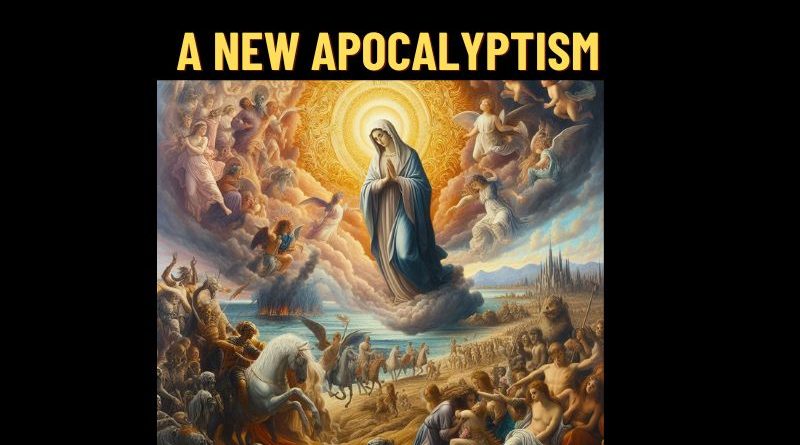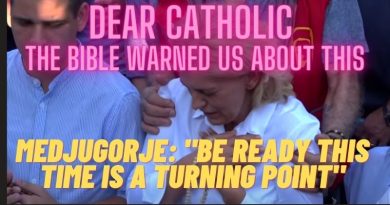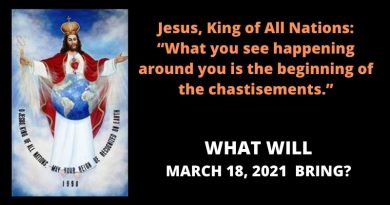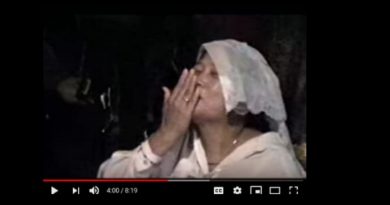A NEW APOCALYPTISM
“ In recent years Russia has seen the emergence of a new pseudo-religious ideology, fraught with the greatest spiritual dangers and the most serious political upheavals, both for the country and for humanity. ”
Dear friends,
A listener sent me an article by a Russian-American scholar, Mikhail Epstejn, which clearly summarizes the worrying drift of the Russian Orthodox Church toward an apocalypticism of global death. This chilling panorama helps us understand why the Queen of Peace has been here for so long to save the world from the catastrophe that the powers of evil are preparing.
A NEW APOCALYPTISM – Michail Epstejn – August 8, 2024
Where is the Russian Orthodox Church going? A profound and shocking analysis by a well-known Russian thinker opens up some glimmers of hope. It is not indifferent for us to try to decipher the tangle of ideologies and impulses that today claim to speak on behalf of Russian Orthodoxy.
After the inauguration ceremony of Vladimir Putin, Patriarch Kirill, while congratulating him in the Kremlin’s Annunciation Cathedral, uttered a mysterious phrase: “I would even dare to say: may God grant that the end of the century also coincides with the end of your tenure in power. You have everything you need to successfully carry out this great task in the service of the Fatherland for a long time to come.”
Of what end of the century is the patriarch speaking here? And why does he himself admit that his wish has something audacious about it?
In recent years Russia has seen the emergence of a new pseudo-religious ideology, fraught with the greatest spiritual dangers and political upheavals, both for the country and for humanity. It has adopted both state Orthodoxy and pagan earth worship, both Eurasian hatred of the West and traits of Nazi ideology and archaic cults of war and the realm of the dead.
It is a kind of apocalypticism sui generis that takes on the darkest aspects of Gnosticism and curses everything that exists as “immersed in evil”. Hence the aspiration to deliver the entire world to a purifying fire that will lead, by the hand of man, to an end of the world whose destructive force would be entrusted to the power of nuclear weapons.
In his Russian Idea (1946), Berdjaev wrote: «We, Russians, are apocalyptic or nihilistic. We are apocalyptic or nihilistic because we are striving toward the ultimate goal and struggle to understand the gradual nature of the historical process, we are hostile to pure form. (…) In Orthodoxy the eschatological aspect of Christianity was expressed more than anything else. Even in Russian nihilism one can distinguish ascetic and eschatological elements. Ours is the people of the ultimate goal, not of the intermediate stage of the historical process».
Hatred of matter
In fact, as a spiritual attitude, nihilism and apocalypticism are two sides of the same identical coin: the denial of any value in this world and the expectation, or even the feverish desire, for its end as quickly as possible.
In this new apocalypticism there are several elements: religious, nationalist and political. First, there are the Gnostic doctrines born from the occult and sectarian ideas of the first centuries of Christianity and the Middle Ages. In Russia, they are at the heart of the ideas of the Old Believers, according to which the world is already prey to the Antichrist and must therefore be destroyed to hasten the return of Christ.
In the post-Soviet era, having entered into a new alliance with the state, the Russian Orthodox Church began to act as its instrument, as a “patriotic” institution, like the army or the National Guard. For a while, this did not prevent Russian Orthodoxy from remaining part of the Universal Church. But in 2018, after the Ecumenical Patriarchate of Constantinople recognized the autocephaly of the Ukrainian Church , the Russian Orthodox Church took a sharp turn for the schism, decided to separate from Universal Orthodoxy and became, in spirit and according to the letter of the law, an “Old Believer” Church.
The Russian Orthodox Church has distanced itself from Nikon’s 17th-century reforms, which brought Russian Orthodoxy closer to Greek Orthodoxy, and thus ceased to be “Greek Catholic” or “Greek Russian” as it was often officially called. On October 16, 2018, the Synod of the Russian Orthodox Church decided to sever all ties of Eucharistic communion with the Patriarchate of Constantinople.
By now it is no longer only the Catholic-Protestant West that is in the grip of evil and has allied itself with the Antichrist, but also the contemporary Orthodox world and, above all, the “fraternal Ukrainian world.” The Russian Church, which in the 11th century, together with the entire Byzantine Church, had distanced itself from Western Christianity, a thousand years later, in the 21st century, before our eyes, has also distanced itself from its Orthodox brothers in the West and has set out on the path of a further schism, that is, on the path of a sort of suicide of faith.
Then, on the other hand, equally heavy steps followed. Already in 1872, an Orthodox Council held in Constantinople had condemned the ” ethnophyletist ” heresy as a form of ecclesiastical racism or tribalism, in that it subordinated the interests of the Church as a whole to the national political interests of a particular ethnic group. And even then it was clear that Russian Orthodoxy was prey to the idea of a subordination of religion to the interests of the state. One hundred and fifty years later, in 2022, while Russia’s war with Ukraine was raging, Ecumenical Patriarch Bartholomew, in his programmatic speech at the international conference. For a Reasonably Open World , emphasized the danger posed to the entire world by this heresy and the schismatic policy of the Russian Orthodox Church.
After the fall of communism, he said, “faith has again been used for ideological purposes. The Russian Orthodox Church has sided with the regime of President Vladimir Putin, especially after the election of His Beatitude Patriarch Kirill in 2009. It plays an active role in promoting the ideology of Russkij Mir . (…) This ideology is the instrument of legitimization of Russian expansionism and the foundation of its Eurasian strategy. The connection between the past of ethnophyletism and the present of the ‘Russian world’ is obvious. Faith thus becomes the very foundation of the ideology of the Putin regime.”
The Ecumenical Patriarch thus described the schismatic nature of the current Russian Orthodox Church, transformed into a nationalist sect within the framework of a State characterized by a policy of great power . Now, to the statism of Russian Orthodoxy has been added a militarism not only of a political nature, but also of an apocalyptic nature, as the Church calls upon its faithful not only to die for their country but, in the event of military defeat, to prepare to annihilate all of humanity.
A new religion of death
In this sense we are witnessing the emergence of a new state religion, a religion of war and the “end times”, which combines ingredients that would otherwise be difficult to reconcile: fascism, Orthodoxy, the religion of the old believers, Eurasianism, Russian nationalism, apocalyptic sectarianism, state worship, imperialism and millenarianism.
This militaristic apocalypticism has practically no connection with the transcendent. If it is a religion, it knows nothing and wants to know nothing of a creator God, nor of the world as a work loved by the God who created it; if it is a Christianity, it speaks neither of Christ, nor of love, nor of mercy, nor of forgiveness, nor of the mystery of the human person, of life and resurrection. It is an apocalypticism, essentially anti-Christian, centered on the idea of death, imbued with hatred for the person, for human dignity and freedom, full of contempt for science and technology, whose only ideal consists in the destruction, in the maximum exhaustion of all that constitutes the material substratum of life and in the elimination of life as such.
This apocalypticism is close to the chthonic conceptions of the power of the earth over man, of the continental mass of the earth devouring individuals and transforming them into weak, soulless and apathetic offshoots of the national body. Hence also the proximity of this apocalypticism to fascism.
As is well known, Umberto Eco had identified 14 characteristic archetypes of fascism, but they can be reduced to a single formula that unites them all. Fascism is a collective attempt to heal from the trauma of birth through the experience of a symbolic (but ultimately also physical) death; in other words, it is an attempt to escape from consciousness, language, individuality and all the anxieties of a distinct and problematic existence. It is a drive to free oneself from one’s own personality and to die ecstatically in the collective bosom of the earth, of the people, of the masses.
In the Russian context, the eschatological mentality (from the Greek eschatos : end) manifests itself much more strongly than in German Nazism or Italian Fascism. And this is not only because the eschatological dimension of Christianity has always been more pronounced in Orthodoxy, but also because, after the invention of the atomic bomb, the idea of the Last Judgment ceased to be a religious concept and took on a practical dimension.
The clearest formulation of this was given to us by Alexander Dugin, because, as an Old Believer, the typical Old Believer representations of the end times are particularly close to his heart: “What is being proclaimed here is the eschatological mobilization of the Eurasians! All things are approaching their end and their conclusion. FINIS MUNDI. The end of the world.”
According to Dugin’s logic, the time has come for Russia to fulfill its mission on a global scale, because, among all known civilizations, it stands out for its conscious orientation towards the end of history and of all things. And he continues:
“What we have to do is not ask ourselves whether the end of the world will come or not, but think about how to bring it about. This is our duty. It will not come by itself… It is up to us to decide. And, above all, it is up to us to find a way to put an end to this story…” .
Mad metaphysicians, possessed by delusions of grandeur and thirst for suicide, think and say many things. The matter becomes much more worrying when such a set of ideas takes hold of a head of state, who is leading his country and the entire world towards nuclear disaster.
Back in 2018, when he presented the latest versions of nuclear weapons to the Federal Assembly, Putin expressed his vision of the future with a phrase that was still considered simply delusional at the time: “As martyrs, we will go to heaven, while they will simply die because they will not have had time to repent.” What is it: a sinister joke, a merciless warning, an act of sacrifice or revenge?
Putin then established for the first time a connection between Russian politics and military devices, on the one hand, and eschatology, the end of the world and the passage to the afterlife, on the other. The ground was indicated for a new religious ideology whose heroes will be the seekers of the end of the world, the martyrs and hedonists of the future apocalypse who, separating themselves from the entire universe, will make the death of humanity their profession.
And now the patriarch, blessing Putin for another term, directly connects the significance of his upcoming activity with the “end of the century.” What century is he talking about? Certainly not our century, not the coming of the 22nd century, when the president will be 148 years old. “Century” in church language is a translation of the Greek “eon.” In the New Testament, “eon” means the entire existing world, as opposed to the “century to come” that will come after the end of the world.
“May the blessing of God, the protection of the Queen of Heaven, remain with you in your life, until the end of the century, as we say.” This is the end of the world as we know it. It is clear that the patriarch deliberately addresses this theme, since it highlights the boldness of his judgment on the supreme mystery. The desire for the end of the eon to coincide with the end of Putin’s stay in power indicates that the apocalyptic madness has passed from Dugin’s idle fantasies to the theological narrative of the Russian Orthodox Church. Moreover, the mission of completing the eon is now entrusted not only to a specific country and people, but also – with the patriarch’s pointing finger – to its leader . Let him rule until the end of this world, and this will also be the perfect fulfillment of his “great service.”
The most characteristic aspect of the new Russian apocalypticism is that, unlike all previous movements of this kind, it is technically armed . To realize its aspirations for a universal end, it possesses nuclear weapons, the stuff of death and hell, which can actually put an end to all life on Earth. This objectification of planetary catastrophe gives apocalypticism the strength and the “argument” that previous Gnostic sects, including the Old Believers, lacked.
They dreamed of a cleansing fire that would burn the world immersed in its sins, but they were powerless to bring it to Earth. Now there is this force, and there is a great country that the necrosectarians want to transform into the apocalyptic vanguard of humanity to fulfill the mission of its self-immolation. There is a leader who paves the way to this goal and there is a priesthood that blesses him.
source Svoboda.org






I feel profoundly sad that this article has been published at mystic post. The inversion of Truth within this despicable piece of work is both shocking and repulsive. I pray that innocents who read this vile anti-Truth are not deceived by it. I also pray that the Holy Spirit shall illuminate the mind of whoever made the gravely erroneous decision to publish such lucifarian rubbish.